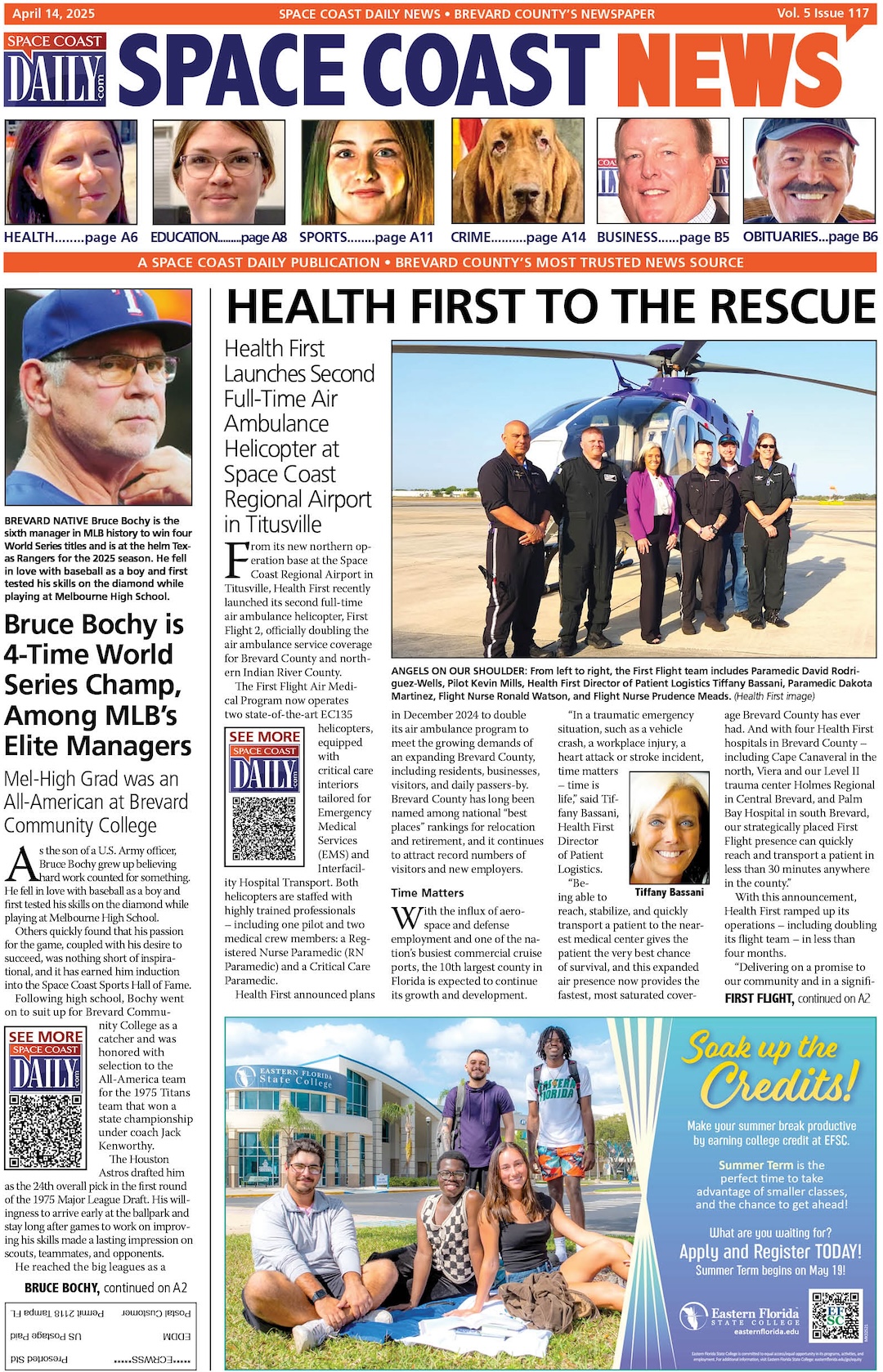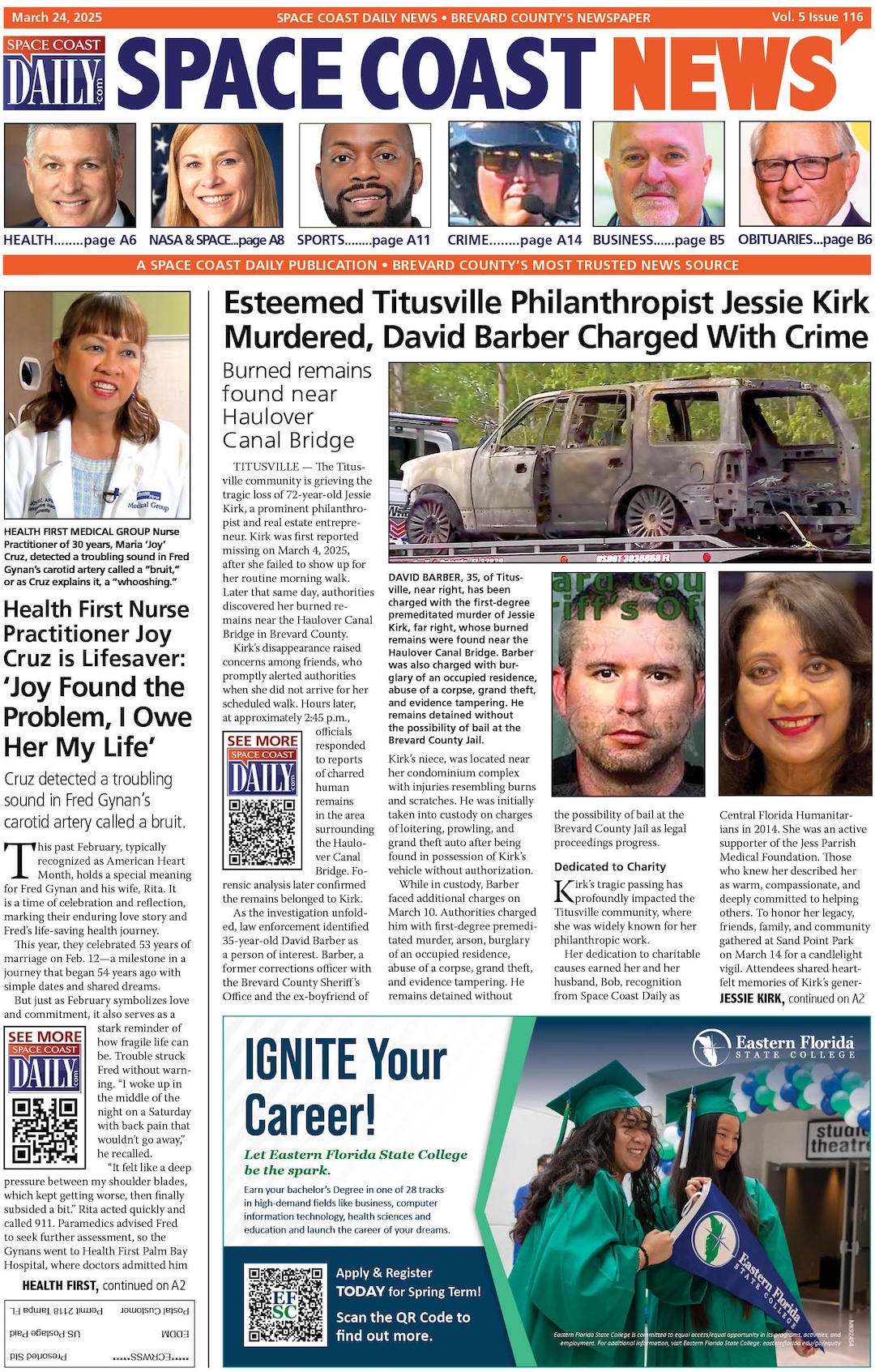8 Types of Nurse Practitioner Specializations
By Space Coast Daily // October 9, 2020

The field of nursing is one that is just as diverse in regard to the career path options available to nurses today as it is challenging and rewarding.
Nurses have long since been deemed some of the most critical components of the healthcare system as a whole, and these days their hard work is getting the credit it is due as more and more nurses are pursuing advanced degrees and opportunities to take their careers further.
The amount of firsthand experience that nurses acquire while working on the frontlines of healthcare is something that can prove to be incredibly value when a nurse is able to assume roles of more responsibility and higher levels of leadership.
Working for years as patient advocates and administering top-notch healthcare allows nurses an insight into the world of direct patient care that not all healthcare professionals are privy too. Moreover, that insight when coupled with the education acquired through advanced degrees prepares nurses for roles of great responsibility in a unique and valuable way.
One such role that a nurse can assume through experience and education is that of a nurse practitioner (NP). NPs are highly educated nurses who choose to specialize in a particular field of medicine.
Some jobs that are available to NPs are within the hospital setting while others can take an NP into the world of private practice. Regardless of the particular path that an NP wishes to pursue, there is a great deal of opportunity within the healthcare community for nurses who possess such credentials.
Becoming an NP requires a great deal of education and perseverance. Any registered nurse (RN) who hold a Bachelor of Science in Nursing (BSN) degree is eligible to pursue this career path.
However, it is important to note that each state has its own requirements regarding the specific credentials that a nurse must earn in order to qualify for NP certification. For instance, some states might require an NP to hold a Master of Science in Nursing (MSN) degree with others might require additional education in the form of a Doctor of Nursing Practice (DNP) degree.
Make sure that you are aware of your state’s specific requirements before embarking on your journey to becoming an NP.
If you are considering taking your nursing career to the next level by becoming a fully qualified NP, here are eight career path options that are available to you should you decide to do so.
1. Family Nurse Practitioner
Many nurse practitioner programs offer a specific type of education that is geared towards a particular specialization or area of medicine. However, when you are looking to become a Family Nurse Practitioner (FNP) your education is going to cover a wide range of topics in terms of general healthcare.
This is because the nature of the job of an FNP is such that you will be evaluating, diagnosing, and offering treatment to patients in much the same way that a family care physician would. This means that you will need to be prepared to administer healthcare to patients from a variety of backgrounds, of a range of ages, and with differing medical histories.
FNPs are, at this time, among the more in-demand healthcare professionals out there. This is due to the fact that there is a growing lack of healthcare professionals in general, a lack that stems to the number of practicing physicians there are.
With fewer physicians to administer to the healthcare needs of the general population in a family practice setting, the healthcare community is turning to FNPs to help fill the void.
Some states even allow FNPs to set up practice for themselves and care for patients without having to do so under the supervision of a physician. This speaks quite highly to the quality of education and experience that FNPs possess. For the most part, such FNPs are given free rein to practice as they see fit, with the exception of being able to prescribe certain medications that only a physician can prescribe.
2. Acute Care Nurse Practitioner
The area of medicine that is referred to as acute care is one in which an NP can specialize and build a successful career. This specialization seeks to treat patients with either acute, chronic, or critical medical conditions.
As an advanced practice NP, Acute Care Nurse Practitioners (ACNP) are responsible for working with a healthcare team to make tough, and occasionally life-changing decisions in regard to a patient’s healthcare.
An ACNP might choose to work in virtually any healthcare setting they wish. There is a need for such care within hospital systems as well as in certain types of private practices. Because such nurses obtain licensing as independent practitioners, they are permitted to administer healthcare to patients without the necessity of physician supervision.
Among the many skills that an ACNP has, one that is particularly important in such a role is the ability to communicate with and educate patients about their conditions.
This is a skill that an ACNP might have worked on as an RN working in direct care, but because an ACNP oversees the entirety of a patient’s care from initial evaluate to the administering of treatment, they are in possession of a greater amount of insight and responsibility over a patient’s condition. They must be able to communicate the particulars of that condition effectively to a patient.
3. Cardiac Nurse Practitioner
As the name might suggest, the role of a cardiac nurse practitioner is one that is focus on working with patients suffering from heart-related conditions. These NPs work closely with physicians in the cardiac setting to diagnose and treat patients with heart conditions ranging from high cholesterol to cardiac arrest.
This is another specialty wherein an NP can choose to work in a variety of settings. There are a great number of positions available to cardiac nurse practitioners in the hospital setting and the private practice setting alike. Furthermore, there is no true age discretion in patients seeking cardiac care as such issues can arise at any time of life. That being said, the majority of cardiac patients tend to fall into the above 65 category.
4. Neonatal Nurse Practitioner
The area of medicine that administers healthcare to pre-term and full-term infants who are at high risk of having medical complications within the first months of life is referred to as neonatal care. Neonatal nurse practitioners (NNP) work within this scope of healthcare. NNPs act as part of the healthcare team that assists and treats infants.
This is naturally an area of medicine that requires a great deal of empathy and patience, as the young patients an NNP cares far are only part of the equation. There is also the family of the infant being treated that must be worked with and dealt with.
Families in such situations are typically under a great deal of stress and are looking to the healthcare team in charge for answers. The ability to communicate well in such instances is crucial if one wishes to pursue this specialization.
As an NNP, you would most likely find yourself employed in the neonatal unit of a hospital. The patients that you will be caring for are most likely going to be experiencing serious health issues, so the ability to remain in focus and administer the very best healthcare, while challenging, is a must. Moreover, an NNP bust be capable of accomplishing this while working as part of the overall unit of healthcare professionals who are in charge of a particular patient.
5. Orthopedic Nurse Practitioner
The field of medicine that deals with the musculoskeletal aspects of healthcare is called orthopedics. An NP who chooses to specialize in orthopedics will be responsible for working as part of a healthcare team that is geared towards evaluating and treating various conditions of this nature.
Some patients who seek orthopedic care do so because of an acute condition while others are seeking pain relief from a chronic condition. The scope of orthopedics is wide, and an orthopedic nurse practitioner must be prepared to treat a variety of conditions.
One topic of conversation that comes up frequently in the world of orthopedic care is that of pain management. The subject of opioid use in managing pain is one that has seen its fair share of controversy in recent decades. What was once common practice in this area is now one that physicians and nurse practitioners alike are encouraged to approach with caution.
Through proper orthopedic care, though, it is possible for some conditions to be successfully treated without the aid of harmful prescription medications that, in the end, can be much more detrimental to the overall health of the majority of patients.
Some patients who seek orthopedic care do so after certain surgeries such as a hip replacement. The rehabilitation and post-operative care that such patients require can be overseen by healthcare professionals who work in orthopedics.
An orthopedic nurse practitioner works closely with physicians, physical therapists, and other members of the orthopedic team to ensure the full recovery of patients who are in the post-operative stages of surgery.
6. Pediatric Nurse Practitioner
Pediatrics is the field of medicine that administers healthcare to patients who are children and adolescents under the age of 21. Pediatric nurse practitioners are essential members of the healthcare team that caters to the needs of young patients in a variety of settings. Pediatric healthcare workers must be prepared to treat an array of conditions as well ranging from the chronic to the acute.
This is another specialization wherein an NP can work either in the private setting or within a hospital setting. A pediatric nurse practitioner must be able to evaluate their patients and offer courses of treatment.
Moreover, the families of a pediatric nurse practitioner’s patients must also be kept in the loop about the approach to treatment that has been proposed for their child. The world of pediatric care is one that can be filled with complications and challenges; however, it is also one that is incredibly rewarding and fulfilling for any skilled NP.
7. Psychiatric and Mental Health Nurse Practitioner
While there are a great many opportunities available in the world of healthcare for skilled and qualified NPs, one area of healthcare that doesn’t directly pertain to a patient’s physical health is that of mental health. Mental healthcare is an area of medicine that has been finally receiving its due attention over the last few decades. The amount of research and resources that have been dedicated to mental health in recent years has resulted in some incredibly promising results.
Continued growth of the mental health treatment field points to strong demand for Psychiatric and Mental Health Nurse Practitioners (PMHNP). Patients need qualified, dedicated PMHNPs to deliver some of the most delicate and challenging aspects of healthcare. Postgraduate mental health courses provide the educational pathway for experienced nurses to become PMHNPs.
PMHNPs have the qualifications and credentials necessary in order to properly evaluate and treat mental health patients even to the point of prescribing certain medications. This is also a specialization that allows an NP to work in a variety of settings. Hospitals are in need of qualified PMHNPs, as are schools, rehabilitation centers, and home health providers. This is truly an area of medicine that has far-reaching ramifications and a great need for qualified PMHNPs.
8. Gerontological Nurse Practitioner
While pediatrics is the area of medicine that treats children and adolescents, there is also a field of medicine that is geared towards treating elderly adult patients as well. Gerontological Nurse Practitioners (GNP) are responsible for administering critical healthcare to older patients. From hospitals to clinics to nursing homes, there are a variety of settings in which a GNP can choose to work.
The advanced degree and training that GNPs receive in order to be prepared for their roles is such that qualifies them to evaluate, diagnose, and treat elderly patients. The ability to assist patients in the later stages of life is one that many GNPs find incredibly rewarding.












